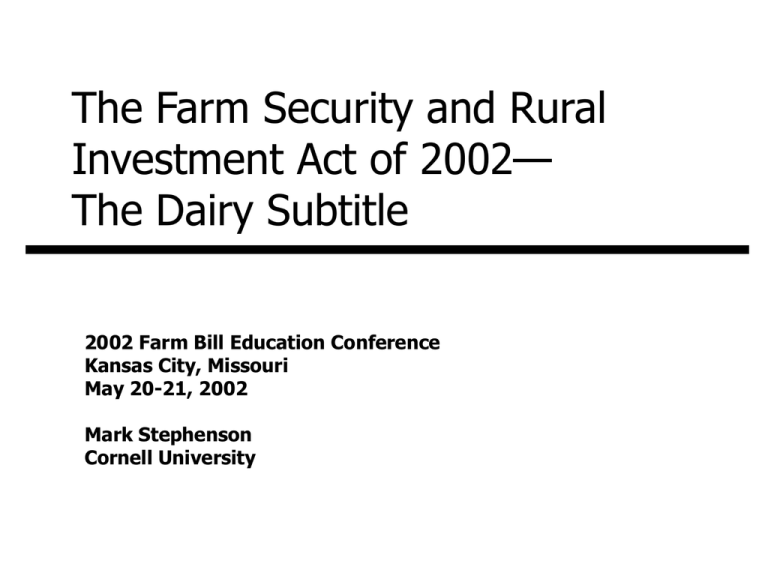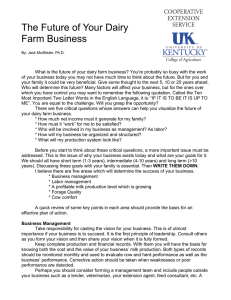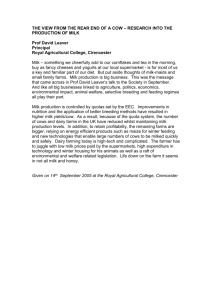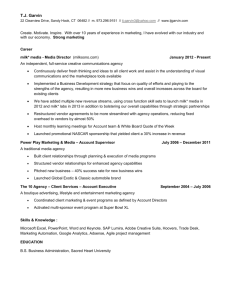The Farm Security and Rural Investment Act of 2002— The Dairy Subtitle
advertisement

The Farm Security and Rural Investment Act of 2002— The Dairy Subtitle 2002 Farm Bill Education Conference Kansas City, Missouri May 20-21, 2002 Mark Stephenson Cornell University Major Pieces… • • • • • • • Milk Price Support Program extended Dairy Export Incentive Program extended Promotion fees for imports Fluid milk promotion extended Mandatory reporting National Dairy Market Loss Payments Three dairy studies Related Pieces • Environmental • Field crops Milk Price Support Program • Has been around in some form since the 1930s • Sets a price goal—not a price • Original idea was price stability—not price enhancement • Found in 1970s that you can buy votes with price enhancement • Found in 1980s that votes can be expensive CCC Purchases & Expenditures 18000 16000 $3,000 Fat Equivalent Milk Dollars $2,500 14000 12000 $2,000 10000 $1,500 8000 6000 $1,000 4000 $500 2000 19 6 19 8 70 19 72 19 74 19 76 19 7 19 8 80 19 82 19 84 19 8 19 6 88 19 90 19 92 19 9 19 4 96 19 98 20 00 0 $0 Price Support & “Tilt” • Current price support level is $9.90 and is to be maintained at that level • Program extended through 2007 • Twice a year, the secretary may adjust purchase price of nonfat dry milk and butter to minimize CCC expenditures Dairy Export Incentive Program • Government accepts bids to close the gap between domestic prices and world market prices • There are dollar and volume limits on DEIP exports • Program provides a low-cost means of relieving downward pressure on domestic markets Promotion • Imports will contribute to National Dairy Promotion and Research Board (Got Milk) • Some of the NDPRB monies will be used to promote U.S. products in export markets • Fluid Milk Promotion extended indefinitely (milk mustache) Mandatory Reporting • Regulated milk prices are now determined with product price formulas - Manufacturing firms must report sales data (price and volume) to NASS - Manufacturing firms must report inventory data to NASS National Dairy Market Loss Payments–Background • Something for everyone - Compact-like in structure (New England is happy) - Tax-payers foot the bill, not consumers (processors are happy) - Regionally uniform access to benefits (Upper Midwest is happy–looks like national pooling) • Losers - Possibly larger dairy producers - Less than average milk drinkers - (Must be a deadweight loss in here somewhere) Features • Trigger—$16.94 class I price in Boston • 45% of the difference when the class I price is lower • Direct payment every month • Payments are retroactive from December 1, 2001 through September 30, 2005 (not entire farm bill) • Only on 2,400,000 pounds of milk per fiscal year (on current production, not a base) • Signup, probably with FSA Detail Questions… • How easy will it be to divide farm into 2.4 million pound units? - Bill says no “reconstitution” of farms - Probably difficult to enforce • Is the payment on the first 2.4 million pounds or can you choose time period? - Want to pick lowest class I prices Herd Size Percent of Maximum Payment 50 100 150 250 500 750 1000 1500 2500 5000 15000 100% 100% 100% 64% 32% 21% 16% 11% 6% 3% Pounds per Cow 17500 20000 22500 100% 100% 100% 100% 100% 100% 91% 80% 71% 55% 48% 43% 27% 24% 21% 18% 16% 14% 14% 12% 11% 9% 8% 7% 5% 5% 4% 3% 2% 2% 25000 100% 96% 64% 38% 19% 13% 10% 6% 4% 2% Impacts… • FAPRI estimates - 89¢ payment on eligible milk production over the life of the program - 17¢ decline in class III price - 28¢ decline in class IV price • Roughly, 500 cows is break even size Concluding Thoughts… • Is this policy? • I think that FAPRI’s price impact estimates are conservative • We are coming off of the largest market price year ever and milk production is coming on strong • These payments will probably retard the loss of small farms and large farms will react favorably to the low feed grain prices. Concluding Thoughts… • Big production and low milk prices are inevitable • CCC purchases will be considerable even with a tilt • The NDMLP will cost much more than the $1.3 billion CBO score • QED—Low milk prices prove the need for the program



